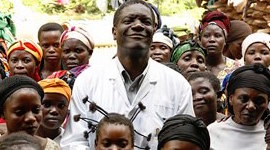With a growing middle class, early-stage frontier markets, enormous demographic advantages, and its ongoing digital transformation, Africa continues to grow in both economic and geopolitical importance. In “Demystifying Africa’s Risk Perception Premium,” Paul Clyde and co-authors make the case for a stronger U.S.- Africa trade and investment relationship, one that changes the narrative around doing business on the continent.
WDI is partnering with several U-M schools and initiatives to screen a new documentary film chronicling the brutal repercussions of the decades-long civil war in the Democratic Republic of the Congo, as well as a live discussion with a heroic doctor who spoke up against the atrocities.

The film, “When Elephants Fight,” will be shown at 5:30 on Sept. 22 in the new School of Nursing building at 426 N. Ingalls. WDI is sponsoring the event, which also will include a Q&A session with the film’s director, Michael Ramsdell, and Dr. Denis Mukwege, a surgeon who runs Panzi Hospital in the city of Bukavu. It is free and open to the public.
Mukwege sees daily the toll the ongoing conflict has on the women and children in the region, and has been an outspoken critic of the atrocities, which have included the sexual assault of more than 40,000 women. His strong words in a United Nations speech in September 2012 about mass rape in the Congo angered government officials and the region’s warring militia groups. A month later, he narrowly escaped an assassination attempt at his home, forcing him to briefly escape to Europe. Mukwege eventually returned to the hospital and has continued to speak out.
His courage has earned him worldwide recognition. He has been nominated three times for the Nobel Peace Prize and was named one of the world’s 50 greatest leaders by Fortune magazine.
Shortly before the assassination attempt, a group of U-M faculty – led by UM School of Public Health graduate Lisa Peters and U-M School of Nursing Professor Janis Miller and including WDI President Paul Clyde – began working with Mukwege. Clyde has called Mukwege “one of the more amazing people I have met.”
With support from the university’s Third Century Initiative, this group helped Mukwege establish the International Center for Advanced Research and Training (ICART) in Bukavu. The center develops sustainable training and research programs that support the specific missions of Panzi Hospital and its associated university, Universite Evangelique D’Afrique (UEA).
One of the biggest factors driving Congo’s long war is control over the country’s rich mineral deposits, especially cobalt, tungsten, tin and gold, which are crucial for manufacturing of electronic devices, such as cell phones.
The 90-minute film highlights how consumer behaviors play a role in the war. Director Ramsdell has called for U.S. companies to be more open about where they source their raw materials, and used a 2012 TED Talk to discuss the issue.
Mukwege was awarded the 2010 Wallenberg Medal at the University of Michigan, named in honor of Raoul Wallenberg, the Swedish diplomat and U-M graduate who rescued tens of thousands of Jews in Budapest during the closing months of World War II.
This spring, Mukwege was given the 2016 Laureate Freedom from Want award from the Roosevelt Institute.
“It is time to engage men and boys, with women and girls, in the struggle to end patriarchal discrimination and gender-based abuses,” Mukwege said when receiving the award. “It is time to draw a red line against rape as a weapon of war, as a weapon of oppression.”
On Sept. 1, he received the Seoul Peace Prize and acknowledged the “heroism of the women and girls of my country, Democratic Republic of Congo.”
“This prestigious award acknowledges the world has not forgotten them, and the Committee honors their resilience,” Mukwege said in a written statement. “Together, we will continue our pursuit for peace and equality around the world.”